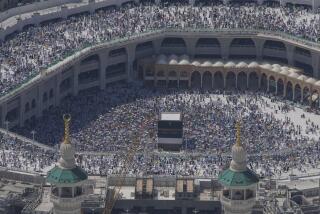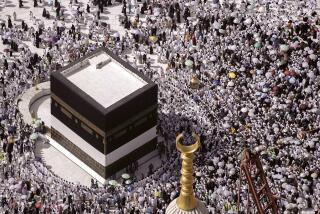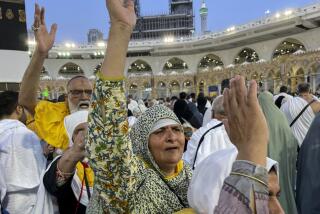U.N. to Permit Libyans to Fly to Mecca
- Share via
CAIRO — The United Nations granted a humanitarian exception to sanctions against Libya on Wednesday, short-circuiting Libyan leader Moammar Kadafi’s announced plan to defy the international air embargo against his country with a planeload of Muslim pilgrims.
Libyan state television showed a Libyan airliner with a reported 150 passengers aboard taking off from Tripoli Airport, supposedly bound for Saudi Arabia.
But while the plane was in the air, Egypt won U.N. Security Council approval in New York to take as many as 6,000 Libyan pilgrims to Saudi Arabia on its national airline, EgyptAir.
The Associated Press reported from Tripoli that the Libyan airliner then landed in Tobruk, 60 miles short of the Egyptian border.
Kadafi for weeks has been threatening to use Libyan airliners to ferry Muslims to Saudi Arabia for the annual hajj, or pilgrimage to Mecca, despite a U.N. ban on air travel into and out of Libya.
The air embargo is part of a 1992 package of U.N. sanctions aimed at forcing Kadafi to turn over for trial two suspects in the bombing of a Pan American jetliner over Lockerbie, Scotland, in 1988. That attack killed 270.
Besides forcing a possible confrontation with the United Nations or the United States, Kadafi’s move seemed intended to present two close Muslim neighbors--Egypt and Saudi Arabia--with a difficult choice of turning back the pilgrims or breaking the air embargo.
The Libyan plane probably would have passed through Egyptian airspace before landing in Saudi Arabia. Egypt then sought a diplomatic solution, offering to carry the pilgrims on EgyptAir.
The Libyan state television broadcast showed dozens of pilgrims clad in traditional white robes boarding a Boeing 727. Some of the pilgrims denounced the United States, which Kadafi blames for the embargo.
At the United Nations, the Security Council granted authority to EgyptAir for 45 flights from Tripoli and Benghazi to Jidda this year for humanitarian reasons.
Czech Ambassador Karel Kovanda, president of the council this month, said he and his colleagues did not even discuss the Libyan plane that left Tripoli earlier in the day.
But he told reporters: “Any flight by Libyan aircraft would indeed be in violation.”
Since Washington opposes easing sanctions on Libya--President Clinton has even suggested making them more onerous with an oil embargo--no U.N. diplomat expected any major exception to the sanctions regime during a closed-door Security Council meeting on Libya.
The Egyptian mission to the United Nations proposed that EgyptAir take a large number of pilgrims, and the council agreed without even putting the matter to a vote. Kovanda said the flights will have to be inspected by U.N. officials at takeoff and at stopovers.
Turner reported from Cairo and Meisler from Washington.
(BEGIN TEXT OF INFOBOX / INFOGRAPHIC)
BACKGROUND
The Islamic faith imposes five basic requirements on its followers. One is the hajj--the pilgrimage to Mecca, Saudi Arabia, birthplace of the Prophet Mohammed, that every Muslim is expected to make at least once. Religious law grants many exceptions to the hajj requirement on grounds of hardship, but the advent of modern transportation ensured that millions of people make the trip annually. Those who complete it are entitled to add the phrase al Hajj , or pilgrim, to their names.
More to Read
Sign up for Essential California
The most important California stories and recommendations in your inbox every morning.
You may occasionally receive promotional content from the Los Angeles Times.













